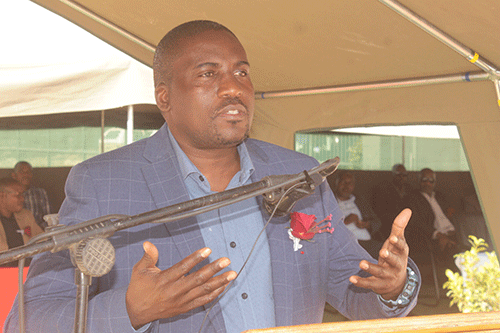NKURENKURU – University of Namibia vice chancellor Kenneth Matengu says the institution will not be relegated to a factory of qualifications but rather aims to produce graduates who would do something meaningful and impact change in the life of Namibians.
The university is also celebrating its 30 years of existence today.
“The university is in the business of human resources production, but we have decided we are not going to be relegated to a factory of qualifications,” he said during an event where health minister Dr Kalumbi Shangula commissioned an oxygen-generating plant at the Nkurenkuru Primary Health Centre last week.
The oxygen tanks and oxygen-generating plants were a donation to the health ministry, which was facilitated by Unam through their partnership with Cardiff University, to enable the ministry to build capacity to respond effectively to the Covid-19 pandemic and any other disease of public concern.
“We would also want not just to train and issue qualifications but also do something meaningful that impacts and changes lives – and as a result of that, we have worked closely with the ministry of health in other areas, such as assisting the ministry in the Hepatitis E pandemic, which we have eliminated,” Matengu noted.
Matengu further assured the ministry and its partners that the university will continue to support the ministry of health in its endeavours.
“Because we believe health coverage can only be effective if we do it together, it’s not something we must just leave to the health ministry but we must all put our hands and resources together to resolve whatever health crisis we may face,’’ he stated.
Matengu noted that as a university, they also listen to the country’s needs.
Unam and the Kavango West regional council recently committed, through a memorandum of understanding, to achieve the region’s agricultural vision of becoming Namibia’s “food basket” and promoting its economic development.
This agreement stems from both institutions’ mutual objectives to elevate the region from multidimensional poverty, recover its economic status and most crucially boost Namibia’s agricultural output by utilising the vast and fertile land as well as livestock resources of the region.
Statistically, Kavango West is one of the poorest, it struggles with services of health and education, and it is characterised by poor living standards of people.
The agreement will go a long way to impact these areas by “adding value to the basic commodities that make a difference in the living standards of the people and advice relevant stakeholders to appropriately channel resources to help elevate these areas”, said Kavango West chief regional officer Mpasi Haingura.
Other areas of collaboration include agro-enterprise development, urban and rural development and resource, innovation, development and capacity building in all sectors.
Kavango West governor Sirrka Ausiku, during the signing of the agreement, said “with good investments, we can address poverty in the region, create jobs and ultimately make the region Namibia’s food basket”.
– jmuyamba@nepc.com.na


